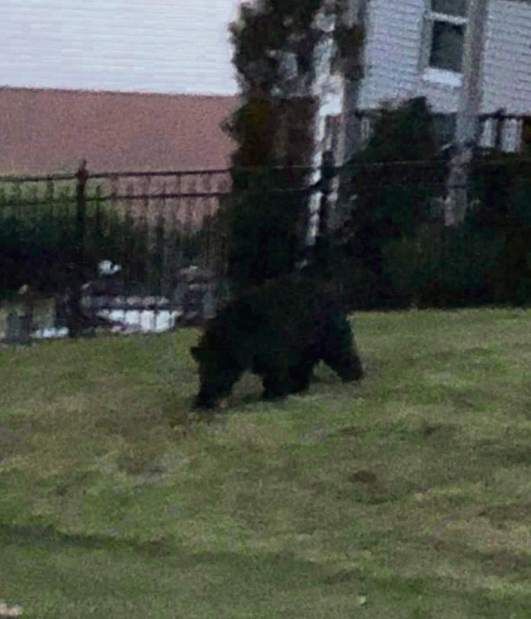https://archive.triblive.com/local/westmoreland/black-bear-spotted-in-hempfields-cherry-creek-neighborhood/
Black bear spotted in Hempfield's Cherry Creek neighborhood

Submitted
A resident photographed a black bear in Hempfield's Cherry Creek neighborhood Monday, June 18, 2018.
Cheryl Kramer spotted a black bear in Hempfield's Cherry Creek subdivision early Monday as she went to let her dog, Charlie, in from the yard.
The brief encounter lasted just long enough for Kramer to snap a photo.
“He just scurried away. He's very fast,” she said of the bear she saw on Troon Drive, adding that it didn't look full grown. “It was definitely a cub, so that's what worried me — where the mom was.”
Neighbors had told Kramer that bears have been seen around the area. She sent the photo to neighbor Alex Belgiovane, who shared it on the Across Westmoreland Facebook page.
“It's no lightweight. He's been eating well,” he said.
Belgiovane said he doesn't think the bear is a threat, but his wife carries bear spray on her walks around the neighborhood just in case.
“I don't think a bear is going to attack. They're scrounging for food, but you never know,” he said.
Kramer suspects the bear might have come from the nearby Scenic Links of Westmoreland golf course, which closed in 2015. “I think part of the problem is with the golf course closing, there's a lot of overgrowth, so we're seeing some wildlife we haven't seen before.”
There have been several black bear sightings in Southwestern Pennsylvania this spring, including Bell Acres, Richland, Edgewood and Pittsburgh's Morningside neighborhood.
Bear sightings are most common from May to early July, according to the Pennsylvania Game Commission. Black bears almost never threaten humans and can usually be convinced to leave by removing food sources such as bird feeders and garbage bags from the area, according to the game commission.
About 20,000 bears live in Pennsylvania, according to a 2015 population estimate. Black bears can run up to 35 miles per hour, climb trees and swim. They can live up to 25 years in the wild, the game commission reports.
Jacob Tierney is a Tribune-Review staff writer. Reach him at 724-836-6646, jtierney@tribweb.com or via Twitter @Soolseem.
Copyright ©2025— Trib Total Media, LLC (TribLIVE.com)
